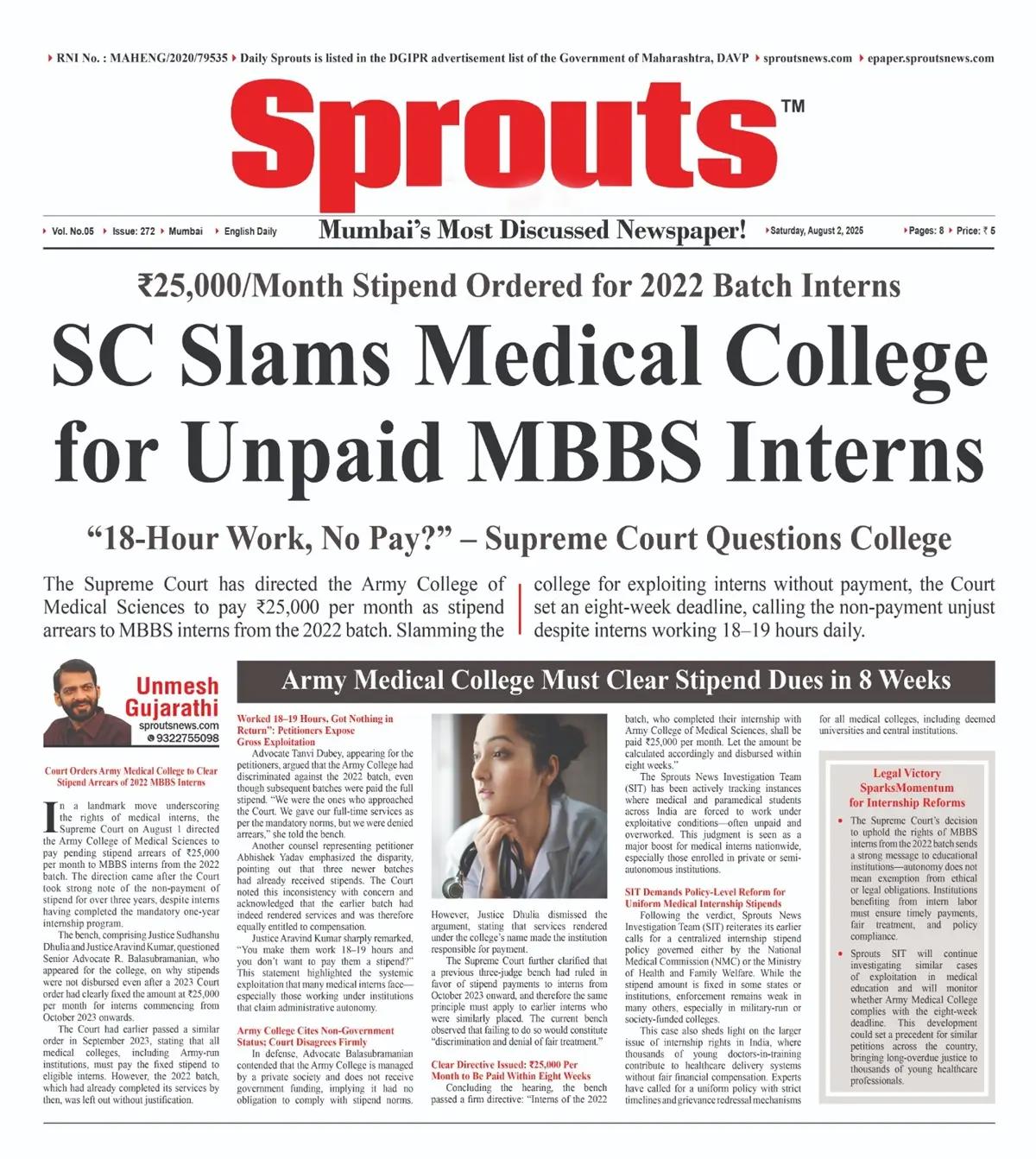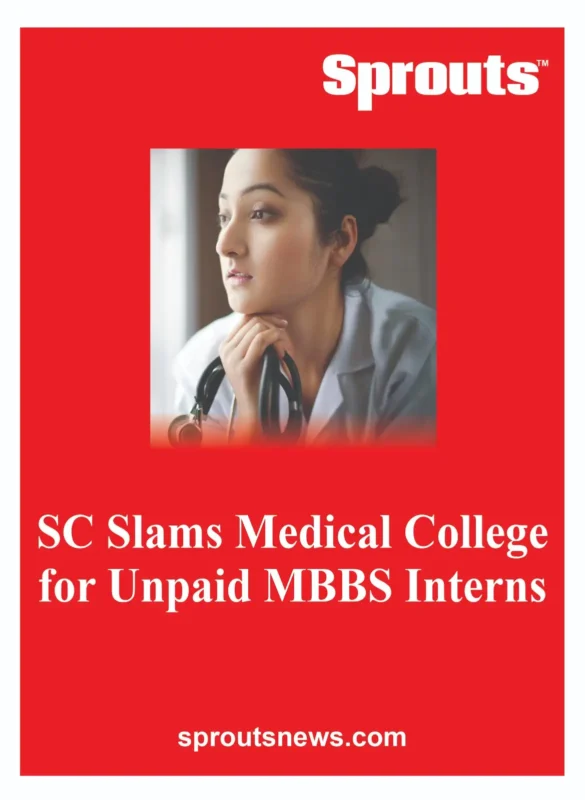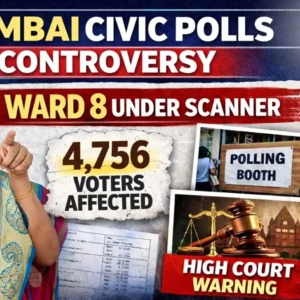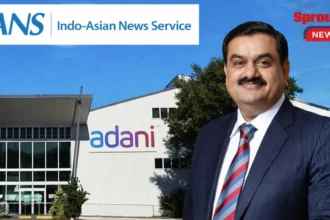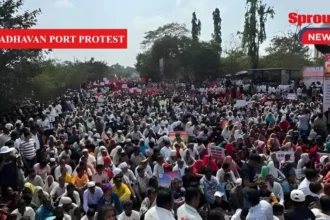SC Slams Medical College for Unpaid MBBS Interns
• ₹25,000/Month Stipend Ordered for 2022 Batch Interns
• “18-Hour Work, No Pay?” – Supreme Court Questions College
• Army Medical College Must Clear Stipend Dues in 8 Weeks
Unmesh Gujarathi
Sprouts News Exclusive
Contact: +91 9322755098
- SC Slams Medical College for Unpaid MBBS Interns
- • ₹25,000/Month Stipend Ordered for 2022 Batch Interns
- • “18-Hour Work, No Pay?” – Supreme Court Questions College
- • Army Medical College Must Clear Stipend Dues in 8 Weeks
- Supreme Court Orders Army Medical College to Clear Stipend Arrears of 2022 MBBS Interns
- “Worked 18–19 Hours, Got Nothing in Return”: Petitioners Expose Gross Exploitation
- Army College Cites Non-Government Status; Court Disagrees Firmly
- Clear Directive Issued: ₹25,000 Per Month to Be Paid Within Eight Weeks
- SIT Demands Policy-Level Reform for Uniform Medical Internship Stipends
- Legal Victory Sparks Momentum for Internship Reforms
The Supreme Court has directed the Army College of Medical Sciences to pay ₹25,000 per month as stipend arrears to MBBS interns from the 2022 batch. Slamming the college for exploiting interns without payment, the Court set an eight-week deadline, calling the non-payment unjust despite interns working 18–19 hours daily.
Supreme Court Orders Army Medical College to Clear Stipend Arrears of 2022 MBBS Interns
In a landmark move underscoring the rights of medical interns, the Supreme Court on August 1 directed the Army College of Medical Sciences to pay pending stipend arrears of ₹25,000 per month to MBBS interns from the 2022 batch. The direction came after the Court took strong note of the non-payment of stipend for over three years, despite interns having completed the mandatory one-year internship program.
The bench, comprising Justice Sudhanshu Dhulia and Justice Aravind Kumar, questioned Senior Advocate R. Balasubramanian, who appeared for the college, on why stipends were not disbursed even after a 2023 Court order had clearly fixed the amount at ₹25,000 per month for interns commencing from October 2023 onwards.
The Court had earlier passed a similar order in September 2023, stating that all medical colleges, including Army-run institutions, must pay the fixed stipend to eligible interns. However, the 2022 batch, which had already completed its services by then, was left out without justification.
Click Here To Download the News Attachment
“Worked 18–19 Hours, Got Nothing in Return”: Petitioners Expose Gross Exploitation
Advocate Tanvi Dubey, appearing for the petitioners, argued that the Army College had discriminated against the 2022 batch, even though subsequent batches were paid the full stipend. “We were the ones who approached the Court. We gave our full-time services as per the mandatory norms, but we were denied arrears,” she told the bench.
Another counsel representing petitioner Abhishek Yadav emphasized the disparity, pointing out that three newer batches had already received stipends. The Court noted this inconsistency with concern and acknowledged that the earlier batch had indeed rendered services and was therefore equally entitled to compensation.
Justice Aravind Kumar sharply remarked, “You make them work 18–19 hours and you don’t want to pay them a stipend?” This statement highlighted the systemic exploitation that many medical interns face—especially those working under institutions that claim administrative autonomy.
Army College Cites Non-Government Status; Court Disagrees Firmly
In defense, Advocate Balasubramanian contended that the Army College is managed by a private society and does not receive government funding, implying it had no obligation to comply with stipend norms. However, Justice Dhulia dismissed the argument, stating that services rendered under the college’s name made the institution responsible for payment.
The Supreme Court further clarified that a previous three-judge bench had ruled in favor of stipend payments to interns from October 2023 onward, and therefore the same principle must apply to earlier interns who were similarly placed. The current bench observed that failing to do so would constitute “discrimination and denial of fair treatment.”
Clear Directive Issued: ₹25,000 Per Month to Be Paid Within Eight Weeks
Concluding the hearing, the bench passed a firm directive: “Interns of the 2022 batch, who completed their internship with Army College of Medical Sciences, shall be paid ₹25,000 per month. Let the amount be calculated accordingly and disbursed within eight weeks.”
The Sprouts News Investigation Team (SIT) has been actively tracking instances where medical and paramedical students across India are forced to work under exploitative conditions—often unpaid and overworked. This judgment is seen as a major boost for medical interns nationwide, especially those enrolled in private or semi-autonomous institutions.
SIT Demands Policy-Level Reform for Uniform Medical Internship Stipends
Following the verdict, Sprouts News Investigation Team (SIT) reiterates its earlier calls for a centralized internship stipend policy governed either by the National Medical Commission (NMC) or the Ministry of Health and Family Welfare. While the stipend amount is fixed in some states or institutions, enforcement remains weak in many others, especially in military-run or society-funded colleges.
This case also sheds light on the larger issue of internship rights in India, where thousands of young doctors-in-training contribute to healthcare delivery systems without fair financial compensation. Experts have called for a uniform policy with strict timelines and grievance redressal mechanisms for all medical colleges, including deemed universities and central institutions.
Also Read: SC issues urgent warning on Himachal ecological collapse.
Legal Victory Sparks Momentum for Internship Reforms
The Supreme Court’s decision to uphold the rights of MBBS interns from the 2022 batch sends a strong message to educational institutions—autonomy does not mean exemption from ethical or legal obligations. Institutions benefiting from intern labor must ensure timely payments, fair treatment, and policy compliance.
Sprouts SIT will continue investigating similar cases of exploitation in medical education and will monitor whether Army Medical College complies with the eight-week deadline. This development could set a precedent for similar petitions across the country, bringing long-overdue justice to thousands of young healthcare professionals.


